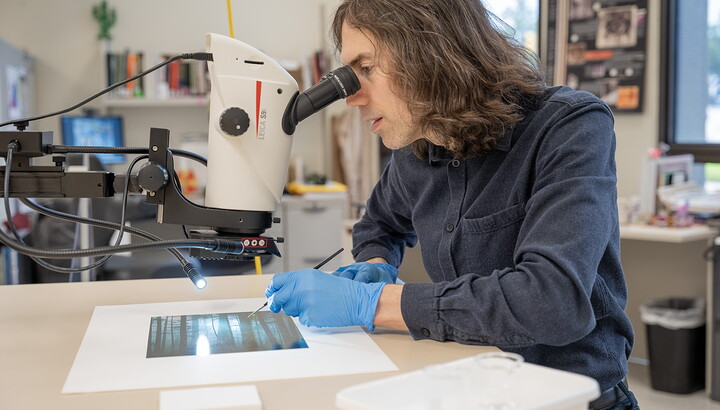The Carter Blog
Carter ARTicles
On the spectrum at the Carter
Apr 05, 2021
This blog post was revised in February 2024.
The Carter strives to be a museum for all, including those with disabilities. Year-round, we offer free activities and programs for visitors with Alzheimer’s/dementia, autism spectrum disorder, cognitive disabilities, and low/no vision. My job is to create experiences and tools for museum visitors with special needs. With April being Autism Awareness Month, let me give you the deets about what we offer for those with autism.
Activities that are always available are our sensory ARTtivity totes that can be checked out at our Information Desk, as well as different self-guided tours for adults and children. But wait . . . there’s more!
Our first autism program launched in fall 2015, then called Sensory Saturdays, and was geared toward families who have a child(ren) on the spectrum plus siblings who were not. It was offered once a month.
When we closed for renovation in 2018, programs went on pause, giving us a chance to reflect on our current offerings and determine ways to improve experiences for our visitors. As an education team, we felt it important to focus on relationship building in the community and to co-create programming with outside voices, prioritizing the expertise of specialists while planning for audiences with disabilities. During that time, I learned more about the autism field and best practices. I connected with local experts at Texas Christian University’s Families, Autism, and Child Emotion Studies Lab (F.A.C.E.S.), University of North Texas Health Science Center’s Autism and Development Disorders Research (relocated to University of Michigan in 2021), and Fort Worth Museum of Science and History. I even bugged my own sister, who is a Registered Behavioral Technician. These conversations made us rethink what we were offering and how.
We created more universally designed tools (resources that can be accessed, understood, and used to the greatest extent possible—such as raised line drawings, sounds, scents, and more); restructured the program; worked to develop community partners, and integrated more training for frontline staff. For the program, we kept it free, theme-based, and on a Saturday morning, but not much else was the same. Now called Sensory Explorations, it’s a one-and-a-half-hour, drop-in program offered two times a year. Families can come and go as they please during this time.
When participants arrive, they receive a social schedule, which is a tool that helps outline experiences and expectations for the event and their visit. Before arriving, families can reference and download our online Know Before You Go that outlines expected behavior.
Families can knock their socks off doing different activities—choosing to do some or all—based on interest, mood, and ability. They may do an art project, jump on a short tour, find facilitated sensory activities in the galleries, and/or enjoy a live interactive performance. Families have the chance to learn from and engage with community partners onsite who have specialized knowledge of autism spectrum disorders. Our sensory ARTtivity totes and self-guide handouts are also available during this event if families want alone time. We even offer a quiet, dimly lit chill zone with soothing objects for those who need a calm moment.
These adjustments in structure and flexibility allowed us to better serve this audience. We had more than 60 guests at the first revamped event in November 2019, and nearly 200 people registered for the second event one month out from the April 2020 date. Since COVID, our numbers have been steadily rebuilding and our last Sensory Explorations, in October 2023, had 92 guests!
Because we've offered family autism programming for so many years, we’ve heard from some families that they wished there were more activities to do for their kids who are 18+ and on the spectrum. This, and my enthusiasm for Netflix’s Love on the Spectrum, (do you watch? If not, go watch it now!) has pushed us to expand our work with local experts to create a live, drop-in program for adults. Our first Meet Up at the Museum launched in September 2021 and happens twice a year. Those coming are mostly college-age and our attendance continues to grow with each event.
Visit our website to find out how to participate in Sensory Explorations and Meet Up at the Museum!
While our virtual programming isn’t the same as our in-person programming (because man oh man, do we have all sorts of sensory experiences!), during COVID we still wanted to offer something to this audience while live programming was on hold. Like our in-person events, each video has a theme. Check out some of our past Virtual Sensory Explorations to get a feel for the events.





